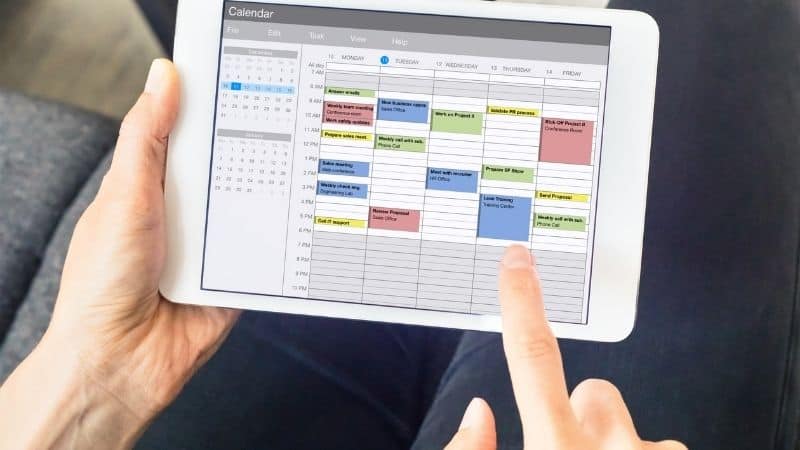Do you keep a to-do list?
I started using a to-do list more than two decades ago. I was still a seminarian. We practiced listing down everything we had to do because people expected us to serve them all.
Our day starts at four o’clock in the morning and ends at around eleven o’clock in the evening. But at the end of the day, though we were dead-tired, our lists showed that many things were left unchecked and undone.
Time management books promote using a to-do list. Many personal organizers are glorified to-do list recorders.
Search for productivity tools, and most likely, you’ll find to-do list apps. Google the phrase “to-do list,” and you will find more than 62 million entries.
Always the aim is to do more for less possible time. And always, no matter how hard we try, we fail. That’s because doing more does not necessarily make us productive and happy.
The problem is not technology. Anyone with a lizard brain can use apps.
The problem is neither the application of strategies. Time management strategies can help us do more. But to be truly effective, to become fruitful and happy, and to multiply our impact, we have to be mindful of our time.
We are not robots. Our aim is not to do more.

Use To-do List Beyond Doing More
We play bigger. Our aim is to make a greater impact. We don’t need to tick every item on our to-do list.
We only need to be mindful of actions that bring the most significant impact in our lives and the lives of others.
Let me illustrate.
I was running a time management workshop for 20 managers. I started the session by asking them to list down what they believed were essential things in their lives.
After five minutes, I asked them to pick the top four and publish them on post-it notes. Then, the participants posted their answers.
- God
- Family
- Work (Friends)
- Friends (Work)
All managers have the same four most important things. God is first. Family second. Work and friends are ranked either in third or fourth.
I requested some managers to explain the difference in ranking between work and friends. I found out that work was “toxic,” and they needed friends to help them.
“Do you have a to-do list?” I asked.
Everyone answered in the affirmative.
“Do you include activities with friends in your to-do list?”
Everyone answered in the affirmative again.
We discussed some activities with their co-workers and friends after work. Social drinking on weekends, for example, helped them “balance” their lives.
“Okay. You said that your family is second to the most important. Do you have a to-do list for your family? Or do you include your family in your daily to-do list?”
Six said yes. The rest of them said no. And one participant, a single mom, said that though she valued her family more than work, her daughter felt the opposite. She told us what happened the day before.
“Mom, what do you think of my new hair?”
“Leave me alone. I am working”.
She said that she felt so guilty about making her daughter felt less important. “I did not look at her. I could have given her five minutes, two minutes, or even a minute. But I was too busy working that I forgot I was home. “
Another participant shared.” Every day, I leave home early in the morning when my children are still sleeping. Then, I get home around eleven in the evening when my children are already sleeping.
It felt like I was checking in a hotel.”
Everyone agreed that they must devote “quality time” to family. But as managers, it was very seldom that they had extra time for quality time.
“Do you pray before you do anything?”
If you have God on top of your list, that question is also for you.
Many Christians can recite to us this Biblical verse: Seek ye first the kingdom of God, and his righteousness, and all these things shall be added unto you.
But very few have God-activities on their to-do list.
So, the question is not “What are the activities I need to accomplish today?”.
Instead, we ask, “What are the most important outcome that I want to achieve today?”
Each day, be mindful of your list. Think first things first.
Exercise
1. Examine your to-do list for the last five days. How does each list make you feel? How does your to-do list speak to you?
(If you have no to-do list, write down those things that occupied most of your time last week.)
2. List down essential things in your life? What actions or activities can help you manifest the importance of these things in your life?

Recommeded Articles
Bahala Na Attitude. Bahala na is often associate with Filipinos cultural flaws. But when you consider what it meant, you’ll realize that it represents Filipinos unwavering faith and the willingness to take action.
Commit to Living a Good Life. Do you want to live a good life? To get a good life, commit to living it daily. Life is sacred. Waste not a minute on toys and trifles. You cannot buy a good life over the counter.
You are your choices. Most people find it challenging to decide. However, you will know who you are by the choices you make every day.
Overestimating Motivation is Counterproductive. Lack of motivation is the safest alibi of leaders who fail to motivate. It is safer to say that people lack motivation than that the leader lacks the skill to lead.
10 Simple Ways to Make a Better to-do list. Making a to-do list isn’t a useless endeavor. PC Mag shared 10 ways you can use to improve the way you manage your time.
One thing more.
You may come up with a to-do list of 3 to 5. Or even 20. We know that you really have so many things to do in a day. That’s okay. What’s important is that when you look at your list, you work with intention. Always pick the one thing that is more important than all the others on the list. As long as you the most significant, you’ll be happy.
If your team is stuck in meetings, misalignment, or slow decisions…
Let’s design one shift they can use immediately.
→ Shift Experiences


